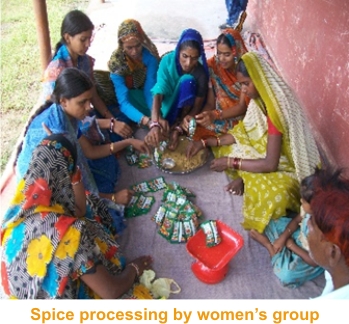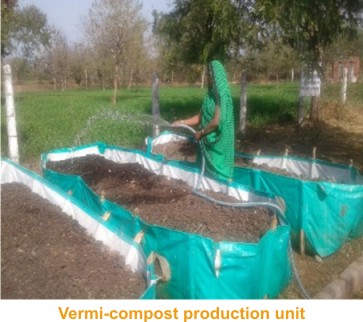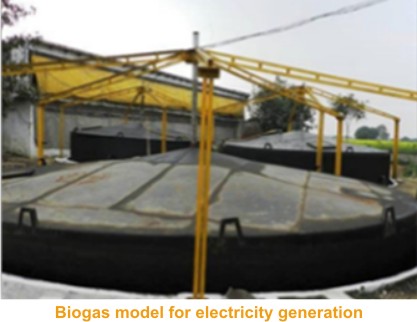|
Creating Wealth from Waste in Gaushalas
There is an ever-increasing number of cattle especially cows, roaming around the streets in India, posing a serious threat to traffic and safety of people as well as the cattle. It is a country-wide problem, spreading from rural areas to metropolitan cities. ‘Gaushala’ is a place where ‘uneconomic’ stray cows can be housed and allowed to live a healthy life. Gaushalas have a huge potential to rejuvenate the entire value chain of livestock-based economy in an integrated manner. Gaushalas help in the productive use of cow dung by generating biogas for electricity and organic manure. This provides first-hand knowledge to communities for value addition of locally available resources, as well as for enhancing the economy of villages.
The SSMM members were imparted training to demonstrate technologically modern, environment friendly and sustainable methods of livestock rearing and fodder cultivation. About 8 hectares of government wasteland were allotted to the federation for demonstrating fodder management activities in order to provide fodder related services to the local communities. The Gaushala is also providing a unique opportunity for green power generation to run enterprises through biogas. Proper management of cow dung has additional benefits of saving greenhouse gas emissions, as dung, if just left in pits, creates anaerobic conditions leading to methane emissions. Methane, as a greenhouse, gas has a global warming potential that is 21 times that of carbon dioxide. The main objectives of the Gaushala initiative are as follows:
These objectives are met by making interventions that include: Capacity Building: A cadre of women members have been trained, and have emerged as change agents. They are accountable for running this model using waste to wealth creation and ensuring an economically sustainable centre for livestock management. Technology: Technical support is provided to the women by identifying situations and resources available to improve their efficiency and business associations, as well as to promote organic farming and livestock-based enterprises. Information and advice is given on strategies and access to better technology and innovation coupled with appropriate packages that could be taken up by women farmers. Institutions: This initiative has is helped in building the capacities of participant trainees, Farmer Producer Organisations, Self Help Groups and women through training and handholding in the field. These institutional associates are being trained and supported to adopt improved business models and dairy based farming practices that are efficient, boost productivity and yield environment co-benefits in the short and the long run. ■
Omkar Gupta
|
 In
2004, Development Alternatives took the initiative of starting a
Gaushala to address the issue of loose cattle and create wealth from
waste. For this purpose, about 50 women from different self-help groups
representing 10 to 12 villages were identified to collectively form a
women’s federation named ‘Sankalp Swashakti Mahila Mandal’ (SSMM),
and run a livestock-based livelihood centre to initiate activities that
would generate supplementary revenue for the members. The women's group
has been efficiently managing Sri Ram Raja Gaushala for more than
a decade now. The Gaushala is seen as a rural economic zone which
runs a biogas-based energy unit and also produces milk, spices and vermi-compost.
In
2004, Development Alternatives took the initiative of starting a
Gaushala to address the issue of loose cattle and create wealth from
waste. For this purpose, about 50 women from different self-help groups
representing 10 to 12 villages were identified to collectively form a
women’s federation named ‘Sankalp Swashakti Mahila Mandal’ (SSMM),
and run a livestock-based livelihood centre to initiate activities that
would generate supplementary revenue for the members. The women's group
has been efficiently managing Sri Ram Raja Gaushala for more than
a decade now. The Gaushala is seen as a rural economic zone which
runs a biogas-based energy unit and also produces milk, spices and vermi-compost. 
 Make efficient use of livestock-based
products for revenue generation like cow dung through biogas for
electricity generation and slurry for vermi-compost production.
Make efficient use of livestock-based
products for revenue generation like cow dung through biogas for
electricity generation and slurry for vermi-compost production.